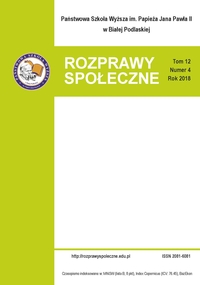Wpływ BMI na stabilność posturalną kobiet w okresie wczesnej starości
The influence of BMI on postural stability of women in the period of early old age
Author(s): Grażyna Olchowik, Marek Tomaszewski, Agata Czwalik, Monika TomaszewskaSubject(s): Health and medicine and law
Published by: Państwowa Szkoła Wyższa im. Papieża Jana Pawła II w Białej Podlaskiej
Keywords: body mass; BMI; postural stability
Summary/Abstract: Introduction. In this study, a quantitative analysis of the BMI index on the postural stability of women in early old age was conducted. Materials and methods. The study was conducted in a group of 41 women aged 60-74. The postural stability of women was assessed using computerized dynamic posturography (CDP). The usefulness of signals coming from sensory organs involved in the control of the body’s balance and the correctness of choosing the appropriate motor strategy were assessed. The deflections of the centre of gravity of the body in the anteroposterior direction and the combined result of body balance analysis were determined. Results. As a result of the conducted research, a negative correlation between the BMI index of the studied women and the results of the balance analysis, as well as the results of the motor strategy analysis was found. Conclusions. Along with the increase in the BMI index, there increases the range of deflections of women’s centre of gravity in the anteroposterior direction. In overweight people, worse use of somatosensory information and hip joint strategy was found. The obtained quantitative relationships between the parameters of the body balance system assessed in the CDP examination and BMI indicate the adverse effect of excessive weight and obesity on the postural stability of women in early old age.
Journal: Rozprawy Społeczne
- Issue Year: 12/2018
- Issue No: 4
- Page Range: 81-86
- Page Count: 6
- Language: Polish

